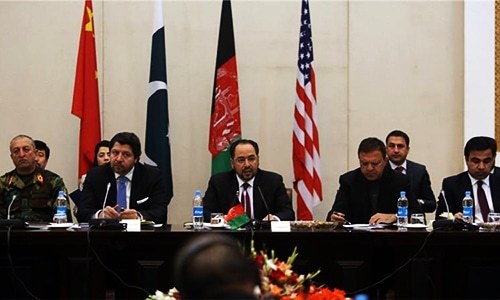AhlulBayt News Agency - Ahmad Zia Masooud, the Afghan President Ashraf Ghani’s special envoy for reform and good governance, has recently asserted that presence of the Mujahedeen in all political and military fields was a vital need of the country, as he called on them to take the leadership of the war in the country because they enjoy a good experience and power.
“If the Mujahedeen and the local commanders do not prepare for the full-scale battle, the fall of the country’s northeastern provinces to Taliban militant group would be unavoidable” noted Zia Masooud, adding “Therefore, base on Mujahedeen suggestion, a Mujahedeen council must form a brigade and it should join the battle as part of Afghanistan’s national army. Through this council, every Afghan citizen has a duty to contribute to the anti-Taliban campaign".
The envoy added that it seemed that the current peace negotiations would produce no results and holding such meetings was waste of time, because the peace process has just begun in the country and it has long way to go. “As long as the relevant countries secure their interests through terror groups, Afghanistan’s peace process would not yield any results”, the president’s envoy maintained.
The reality is that the security and peace in Afghanistan have always been ambiguous mystery. The US has occupied Afghanistan under the pretext of fight against terrorism. Washington also claimed that it wanted to provide security and rebuild the country for the Afghans. But in practice not only did Afghanistan witness no security improvement but also there was a boom in the insecurity and the number of terror and militant groups as destabilizing factors inside the country. As a result, now the map of war stretches from the country’s southern to western and northern regions. An array of terror groups, including ISIS, al-Qaeda, Haqqani Network and Hezb-e Islami Gulbuddin Hikmatyar are pursuing their destabilizing and destructive activities in each and every corner of the country.
Accordingly, Afghanistan’s current conditions and the future of the country’s security are majorly tied to the policy and performance of the US forces in three fields: fighting against terrorism, providing security and making peace. This is coming while the Americans have not acted in an honest way in pursuing these three issues, and essentially they have failed to curb Taliban’s militants. Thus, they have changed approach to Taliban and preferred to negotiate with the militant group. Though peace talks with Taliban have been commenced several years ago, a serious process of negotiations has recently been launched by the four-nation group, namely the US, China, Pakistan and Afghanistan. Three rounds of talks so far have been held in Islamabad and Kabul, as the fourth round was held in Afghanistan’s Kabul yesterday. But the fact is that, while no side adheres to ceasefire and the terror acts and insecurity continue to exist, seeking peace through negotiations would be a waste of time.
With regard to these facts, Ahmed Zia Masooud, who himself is a member of Afghan Northern Alliance, or officially United Islamic Front for Salvation of Afghanistan, these days is touring the Afghan northern provinces like Takhar, Kunduz and Badakhshan to learn about the security conditions there.
Expressing concerns over the security circumstances there, Zia Masooud has asked a serious confrontation of Taliban by the Mujahedeen. He suggests that a combat brigade is formed by the council of Mujahedeen to strongly face the terrorists. This issue has been ignored during the past years, as Ashraf Ghani’s nonchalance in a way has paved the way for Taliban to find a chance to flex muscles in the country. Actually, President Ashraf Ghani looks at Taliban as an insurgent group which could take part in Afghanistan’s power structure. This is coming while the Mujahedeen question the national unity government’s ignorance of Taliban’s war crimes and request that the war criminals be sent to trials.
Anyway, the conflicting approaches on confronting Taliban along with the government’s weakness and impotency in the face of such groups as Taliban on the one hand and interventionist policy of the Western countries as well as pro-Taliban regional countries have pushed the militant group to find opportunity to show off its power.
Furthermore, the interventions of some of regional countries have led to emergence of ISIS terror organization in Afghanistan. While making hundreds of millions of dollars through smuggling drugs, Taliban is backed by some of the region’s states. As the evidences confirm, Taliban militants have not retreated from their stances in dealing with the Afghan government and the foreign forces and they do not have intention to do so in the future. Thereby, it is unlikely that the peace negotiations conclude in a certain result.
/129
source : Al Waqt News
Thursday
25 February 2016
9:18:54 AM
737043

If the Mujahedeen and the local commanders do not prepare for the full-scale battle, the fall of the country’s northeastern provinces to Taliban militant group would be unavoidable...
